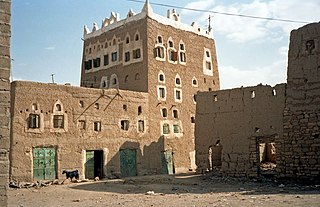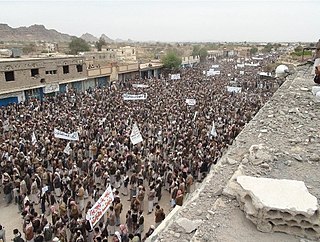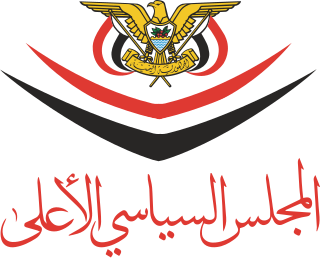
Sa'ada University is a university in Saada, Yemen.

Sa'ada University is a university in Saada, Yemen.
Yemen's president, Ali Abdullah Saleh announced the construction of the university in 2010, in order to better service the educational needs of people in Sa'ada province, who at the time had to travel to Sanaa for university education. [1] [2] Student enrolment dropped during the Yemeni civil war, and four buildings were damaged in a 2015 air strike. [3] [4]
As of June 2022, the rector is Dr. Abdulrahim Al-Humran. [5]

Marib is the capital city of Marib Governorate, Yemen. It was the capital of the ancient kingdom of Sabaʾ, which some scholars believe to be the ancient Sheba of biblical fame. It is about 120 kilometres east of Yemen's modern capital, Sanaa, and is in the region of the Sarawat Mountains. In 2005 it had a population of 16,794. However, in 2021, it had absorbed close to a million refugees fleeing the Yemeni Civil War.

Saada, situated in the northwest of Yemen, is the capital and largest city of the governorate of the same name, and the seat of the eponymous district. The city is located in the mountains of Serat (Sarawat) at an altitude of about 1,800 meters. In 2004, it was the tenth-largest city in Yemen and had an estimated population of 51,870.

The Houthi insurgency, also known as the Houthi rebellion, the Sa'dah War, or the Sa'dah conflict, was a military rebellion pitting Zaidi Shia Houthis against the Yemeni military that began in Northern Yemen and has since escalated into a full-scale civil war. The conflict was sparked in 2004 by the government's attempt to arrest Hussein Badreddin al-Houthi, a Zaidi religious leader of the Houthis and a former parliamentarian on whose head the government had placed a $55,000 bounty.

The battle of Saada was a military confrontation that erupted in March 2011 between Houthi rebels and tribal forces loyal to Yemeni President Ali Abdullah Saleh in the northern city of Saada. Following days of heavy clashes, the Houthis managed to capture the entire Saada Governorate including its provincial capital and established an independent administration, thereby marking the first such Yemeni governorate to fall out of central government control since the nationwide uprising began in 2011. Saada later becomes known as the Houthi stronghold since its takeover.
Operation Scorched Earth was the code-name of a Yemeni military offensive in the Saada Governorate that began in August 2009. It marked the fifth wave of violence during the ongoing insurgency by the Houthis against the government. In November 2009, the conflict spread across the border into neighboring Saudi Arabia. This conflict led to the Saudi military's incursion into Yemen, marking the first military operation conducted by Saudi Arabia since 1991.

Abdul-Malik Badruldeen al-Houthi, also known as Abu Jibril, is a Yemeni politician and religious leader, who serves as the leader of the Houthi movement, a movement principally made up of Zaidi Muslims. His brothers, Yahia and Abdul-Karim are also leaders of the group, as were his late brothers Hussein, Ibrahim, and Abdulkhaliq. Abdul-Malik al-Houthi is the leading figure in the Yemeni Civil War which started with the Houthi takeover in Yemen in the Saada Governorate in northern Yemen.
Fares Mohammed Manaa is a top Yemeni arms-dealer, businessman, rebel commander and politician. He is said to be Yemen's most famous arms-dealer. Manaa was born on February 8, 1965, in the northern city of Saada. He was an ally of Yemeni President Ali Abdullah Saleh and member of his ruling GPC party and served as head of his presidential committee and as head of a local council tasked with mediating a peace-deal between the Yemeni government and Houthis during the Shia insurgency in Yemen. His brother was the governor of Saada Governorate at the time.

The siege of Dammaj began in October 2011 when the Houthis, a rebel group which controls the Saada Governorate, accused Salafis loyal to the Yemeni government of smuggling weapons into their religious center in the town of Dammaj and demanded they hand over their weapons and military posts in the town. As the Salafis refused, Houthi rebels responded by imposing a siege on Dammaj, closing the main entrances leading to the town. The town was controlled by the Houthis and the fighting was mainly centered at Dar al-Hadith religious school, which was operated by Salafis.

The National Dialogue Conference (NDC) was a transitional dialogue process held at the Movenpick Hotel in Sanaa, Yemen from March 18, 2013 to January 24, 2014, as part of the Yemeni crisis reconciliation efforts.

The Yemeni crisis began with the 2011–2012 revolution against President Abdullah Saleh, who had led Yemen for 33 years. After Saleh left office in early 2012 as part of a mediated agreement between the Yemeni government and opposition groups, the government led by Saleh's former vice president, Abdrabbuh Mansur Hadi, struggled to unite the fractious political landscape of the country and fend off threats both from Al-Qaeda in the Arabian Peninsula and from Houthi militants that had been waging a protracted insurgency in the north for years.

Abdel-Aziz bin Habtour is a Yemeni politician who served as prime minister of Houthi-led government in Sanaa from 4 October 2016 to 10 August 2024. On Saturday, August 10, 2024, Bin Habtour was appointed as a member of the Supreme Political Council. He also served as Governor of Aden during the Houthi takeover in Yemen. He is a member of the General People's Congress, sitting on its permanent committee since 1995. An ally of President Abdrabbuh Mansur Hadi, he condemned the 2014–15 Yemeni coup d'état and received the deposed leader after his flight from the Houthi-controlled capital of Sanaa on 21 February 2015. He is also a vocal opponent of the separatist movement in the former South Yemen, saying the movement is too fractured and small to achieve its goals.

On 26 March 2015, Saudi Arabia, leading a coalition of nine countries from West Asia and North Africa, launched a military intervention in Yemen at the request of Yemeni president Abdrabbuh Mansur Hadi, who had been ousted from the capital, Sanaa, in September 2014 by Houthi insurgents during the Yemeni Civil War. Efforts by the United Nations to facilitate a power sharing arrangement under a new transitional government collapsed, leading to escalating conflict between government forces, Houthi rebels, and other armed groups, which culminated in Hadi fleeing to Saudi Arabia shortly before it began military operations in the country.

The Houthi–Saudi Arabian conflict is an ongoing armed conflict between the Royal Saudi Armed Forces and Iran-backed Yemeni Houthi forces that has been taking place in the Arabian Peninsula, including the southern Saudi regions of Asir, Jizan, and Najran, and northern Yemeni governorates of Saada, Al Jawf, and Hajjah, since the onset of the Saudi Arabian-led intervention in Yemen in 2015.

War crimes and human rights violations, committed by all warring parties, have been widespread throughout the Yemeni civil war. This includes the two main groups involved in the ongoing conflict: forces loyal to the current Yemeni president, Abdrabbuh Mansur Hadi, and Houthis and other forces supporting Ali Abdullah Saleh, the former Yemeni president. Al-Qaeda in the Arabian Peninsula and the Islamic State of Iraq and the Levant have also carried out attacks in Yemen. The Saudi-led coalition, backed by the United States and other nations, has also been accused of violating human rights and breaking international law, especially in regards to airstrikes that repeatedly hit civilian targets.

The Supreme Political Council is an executive body formed by the Houthi movement and the pro-Houthi faction of the General People's Congress (GPC) to rule Yemen. Formed on 28 July 2016, the presidential council consists of thirteen members and was headed by Saleh Ali al-Sammad as president until he was killed by a drone strike on 19 April 2018, with Qassem Labozah as vice-president. Presently the council is headed by Mahdi al-Mashat as Chairman.
On 21 January 2022, according to news sources a Saudi-led coalition carried out an airstrike on a prison in Saada, Yemen, killing at least 87 people. The coalition denied targeting the center.

Jeel Albena Association for Humanitarian Development, also known as Jeel Albena, is a Yemeni not for profit organisation, founded by Ameen Jubran in 2017. It won the Nansen Refugee Award in 2021.
Ameen Hussain Jubran is a Yemeni chemist and the founder of Jeel Albena Association for Humanitarian Development. In 2021, he accepted a Nansen Refugee Award on behalf of the organisation.
The following is a timeline of the Yemeni humanitarian crisis, ongoing since the mid-2010s.